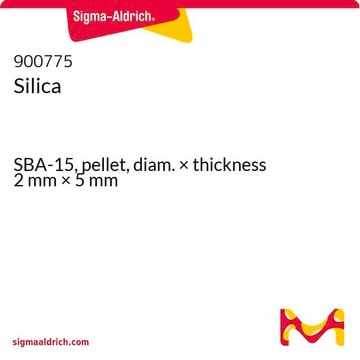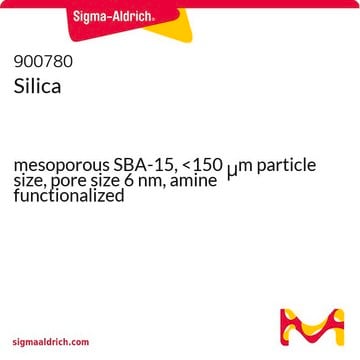900773
Silica
MCM-41, pellet, diam. × thickness 2 mm × 5 mm
Synonym(s):
Mesoporous slica, Mesostructured silica
Sign Into View Organizational & Contract Pricing
All Photos(1)
About This Item
UNSPSC Code:
12352103
NACRES:
NA.23
Recommended Products
Looking for similar products? Visit Product Comparison Guide
Related Categories
Application
Unique physical properties such as high surface area and ordered pore structure make mesoporous silica useful for diverse applications extending from CO2 sequestration to catalysis and heavy metal removal from waste streams. Our pelletized mesoporous materials are easy to handle and suitable for aforementioned applications especially in column format which is often required during continuous processing.
Storage Class Code
13 - Non Combustible Solids
WGK
WGK 3
Flash Point(F)
Not applicable
Flash Point(C)
Not applicable
Certificates of Analysis (COA)
Search for Certificates of Analysis (COA) by entering the products Lot/Batch Number. Lot and Batch Numbers can be found on a product’s label following the words ‘Lot’ or ‘Batch’.
Already Own This Product?
Find documentation for the products that you have recently purchased in the Document Library.
Customers Also Viewed
Synthesis of Gold Catalysts Supported on Mesoporous Silica Materials: Recent Developments.
Gutierrez LF, et al.
Catalysts, 1, 97-154 (2011)
Aoife M Burke et al.
Journal of hazardous materials, 164(1), 229-234 (2008-09-23)
Here we demonstrate aminopropyl and mercatopropyl functionalised and bi-functionalised large pore mesoporous silica spheres to extract various metal ions from aqueous solutions towards providing active sorbents for mitigation of metal ion pollution. Elemental analysis (EA) and FTIR techniques were used
Amrit Kumar et al.
Angewandte Chemie (International ed. in English), 54(48), 14372-14377 (2015-10-07)
Sequestration of CO2, either from gas mixtures or directly from air (direct air capture, DAC), could mitigate carbon emissions. Here five materials are investigated for their ability to adsorb CO2 directly from air and other gas mixtures. The sorbents studied
Our team of scientists has experience in all areas of research including Life Science, Material Science, Chemical Synthesis, Chromatography, Analytical and many others.
Contact Technical Service





